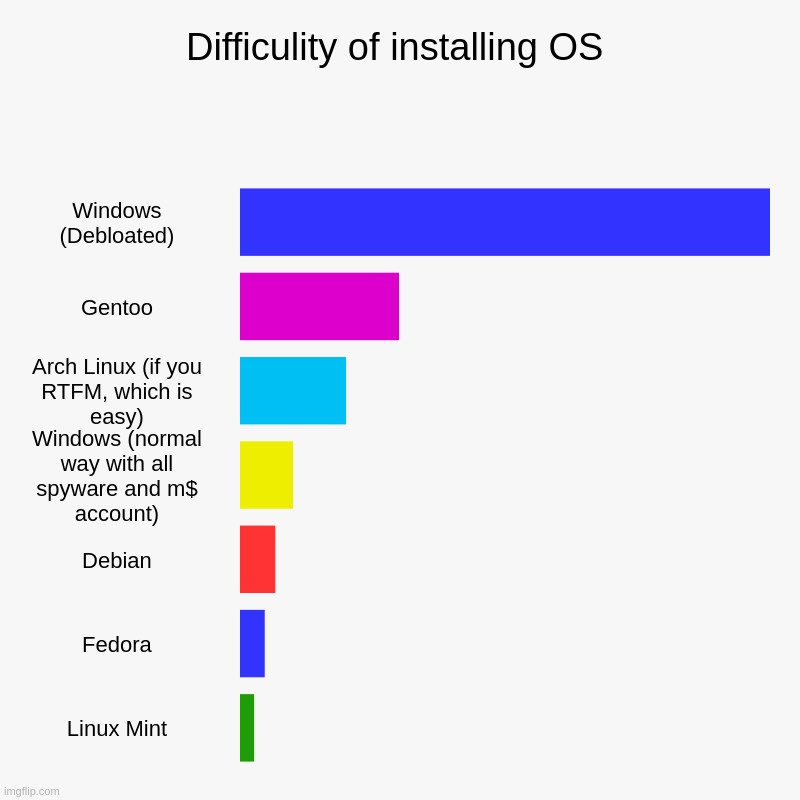this post was submitted on 21 Nov 2024
800 points (89.2% liked)
linuxmemes
24512 readers
3477 users here now
Hint: :q!
Sister communities:
Community rules (click to expand)
1. Follow the site-wide rules
- Instance-wide TOS: https://legal.lemmy.world/tos/
- Lemmy code of conduct: https://join-lemmy.org/docs/code_of_conduct.html
2. Be civil
- Understand the difference between a joke and an insult.
- Do not harrass or attack users for any reason. This includes using blanket terms, like "every user of thing".
- Don't get baited into back-and-forth insults. We are not animals.
- Leave remarks of "peasantry" to the PCMR community. If you dislike an OS/service/application, attack the thing you dislike, not the individuals who use it. Some people may not have a choice.
- Bigotry will not be tolerated.
3. Post Linux-related content
- Including Unix and BSD.
- Non-Linux content is acceptable as long as it makes a reference to Linux. For example, the poorly made mockery of
sudoin Windows. - No porn, no politics, no trolling or ragebaiting.
4. No recent reposts
- Everybody uses Arch btw, can't quit Vim, <loves/tolerates/hates> systemd, and wants to interject for a moment. You can stop now.
5. 🇬🇧 Language/язык/Sprache
- This is primarily an English-speaking community. 🇬🇧🇦🇺🇺🇸
- Comments written in other languages are allowed.
- The substance of a post should be comprehensible for people who only speak English.
- Titles and post bodies written in other languages will be allowed, but only as long as the above rule is observed.
6. (NEW!) Regarding public figures
We all have our opinions, and certain public figures can be divisive. Keep in mind that this is a community for memes and light-hearted fun, not for airing grievances or leveling accusations. - Keep discussions polite and free of disparagement.
- We are never in possession of all of the facts. Defamatory comments will not be tolerated.
- Discussions that get too heated will be locked and offending comments removed.
Please report posts and comments that break these rules!
Important: never execute code or follow advice that you don't understand or can't verify, especially here. The word of the day is credibility. This is a meme community -- even the most helpful comments might just be shitposts that can damage your system. Be aware, be smart, don't remove France.
founded 2 years ago
MODERATORS
you are viewing a single comment's thread
view the rest of the comments
view the rest of the comments

See, Ubuntu only requires pressing next 6 times, and Fedora is only 8.
That's essentially what it boils down to nowadays.
Unless you want tpm backed full disk encryption in which case.... Good luck
One click for Mac and windows, a lifetime of fun for Linux (except arch w/sysdboot which works pretty good)
I'm happy with regular password FDE, i think i'm more likely to encounter hardware failure (and then need to read the drive from another machine) than theft of the drive.
It's a good point though, I'm sure many people do need this feature. Ubuntu is "working on it" but so far i guess it's mostly not working except for VMs
I have a media center that serves over the internet via VPN, I don't want to leave it unencrypted but I also don't want to have to go home and type in a pass every time California has a power outage, which is monthly during the dry fire season and >monthly during the "storm" season. I wouldn't care as much for my personal laptop or anything, but for servers it seems like an absolute must have and..what is Linux for if not servers?
I think the traditional way to do that is via dm-crypt, which you can set up with an ssh server.
You can also use a network-shared file rather than a password for LUKS but it's not as straightforward to set up as a password. If you are doing something like tailscale then it'd be unlocked as long as you are on the VPN
Typing in a password in-person at a data center would be a huge hassle, agreed
But...it's literally what the tpm chip is for. Like there may be other options, but the tpm chip's purpose in life is to do this thing. And it's been doing that for a decade. Seems pretty traditional to me. But Linux folks in some venues treat it like a plague that needs to be eradicated.
Looking at RHEL docs it seems to also work there. The same instructions probably work in Fedora but idk I've never done it myself
I've done the recommendation for opensuse and fedora, both failed to boot properly. Weirdly arch was the easy one that worked out of box.